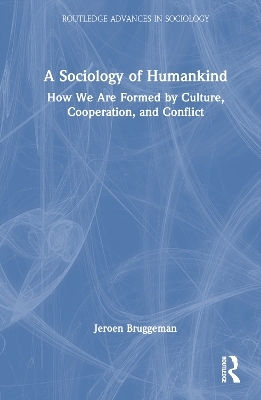
A Sociology of Humankind
How We Are Formed by Culture, Cooperation, and Conflict
Seiten
2024
Routledge (Verlag)
978-1-032-60857-0 (ISBN)
Routledge (Verlag)
978-1-032-60857-0 (ISBN)
Grounded in empirical findings from archaeology, history, lab-experiments and field studies – and supplemented with computational network models – this book extends the theory of cultural evolution, proposing a sociology of humankind that connects all people throughout history in a giant socio-cultural network spanning 300 millennia.
Based upon the interdependencies of human beings as we cooperate and conflict with each other, how we share information, and how culture evolves, this book proposes a sociology of humanity covering three hundred millennia. Grounded in empirical findings from archaeology, history, lab experiments, and field studies – supplemented for precision with computational network models of cultural evolution, cooperation, influence, cohesion, warfare, power, social balance, and inequality – this is the first attempt at encompassing sociology of humankind. Informed by the theory of cultural evolution, it extends the notion that cultural evolution connects humans of all times in a giant sociocultural network, thereby yielding coherence between a great many empirical findings. It will therefore appeal to scholars of sociology and anthropology with interests in historical sociology, cultural evolution, and social theory.
Based upon the interdependencies of human beings as we cooperate and conflict with each other, how we share information, and how culture evolves, this book proposes a sociology of humanity covering three hundred millennia. Grounded in empirical findings from archaeology, history, lab experiments, and field studies – supplemented for precision with computational network models of cultural evolution, cooperation, influence, cohesion, warfare, power, social balance, and inequality – this is the first attempt at encompassing sociology of humankind. Informed by the theory of cultural evolution, it extends the notion that cultural evolution connects humans of all times in a giant sociocultural network, thereby yielding coherence between a great many empirical findings. It will therefore appeal to scholars of sociology and anthropology with interests in historical sociology, cultural evolution, and social theory.
Jeroen Bruggeman is Associate Professor of Sociology at the University of Amsterdam, the Netherlands, and the author of Social Networks: An Introduction.
1. Introduction 2. Forager Societies 3. Cooperation 4. Agricultural Societies 5. Conflict 6. Imperialism and Industrialization 7. Digital Society 8. Models 9. Conclusions
| Erscheinungsdatum | 15.03.2024 |
|---|---|
| Reihe/Serie | Routledge Advances in Sociology |
| Zusatzinfo | 17 Line drawings, black and white; 4 Halftones, black and white; 21 Illustrations, black and white |
| Verlagsort | London |
| Sprache | englisch |
| Maße | 156 x 234 mm |
| Gewicht | 603 g |
| Themenwelt | Geisteswissenschaften ► Psychologie ► Allgemeine Psychologie |
| Sozialwissenschaften ► Soziologie ► Allgemeines / Lexika | |
| ISBN-10 | 1-032-60857-9 / 1032608579 |
| ISBN-13 | 978-1-032-60857-0 / 9781032608570 |
| Zustand | Neuware |
| Informationen gemäß Produktsicherheitsverordnung (GPSR) | |
| Haben Sie eine Frage zum Produkt? |
Mehr entdecken
aus dem Bereich
aus dem Bereich
Techniken der Verhaltenstherapie
Buch (2024)
Julius Beltz GmbH & Co. KG (Verlag)
35,00 €


